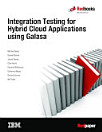Modernizing Applications with IBM CICS
এই ই-বুকের বিষয়ে
This IBM Redpaper publication focuses on modernizing these CICS applications, allowing them to integrate with cloud-native applications. This modernization can be achieved either by constructing application programming interfaces (APIs) that allow new cloud-native applications to connect to your existing assets, rewriting parts of your application in newer languages and hosting them back on CICS, or by using CICS capabilities to extend your applications to provide new capabilities and functions.
The paper takes a traditional example application and shows you how it works. Then, the paper extends the example, rewrites portions of its functions, and enables its APIs. It also explains how CICS applications can use continuous integration (CI) and continuous delivery (CD) to deliver, test, and deploy code into CICS easily and with quality.




